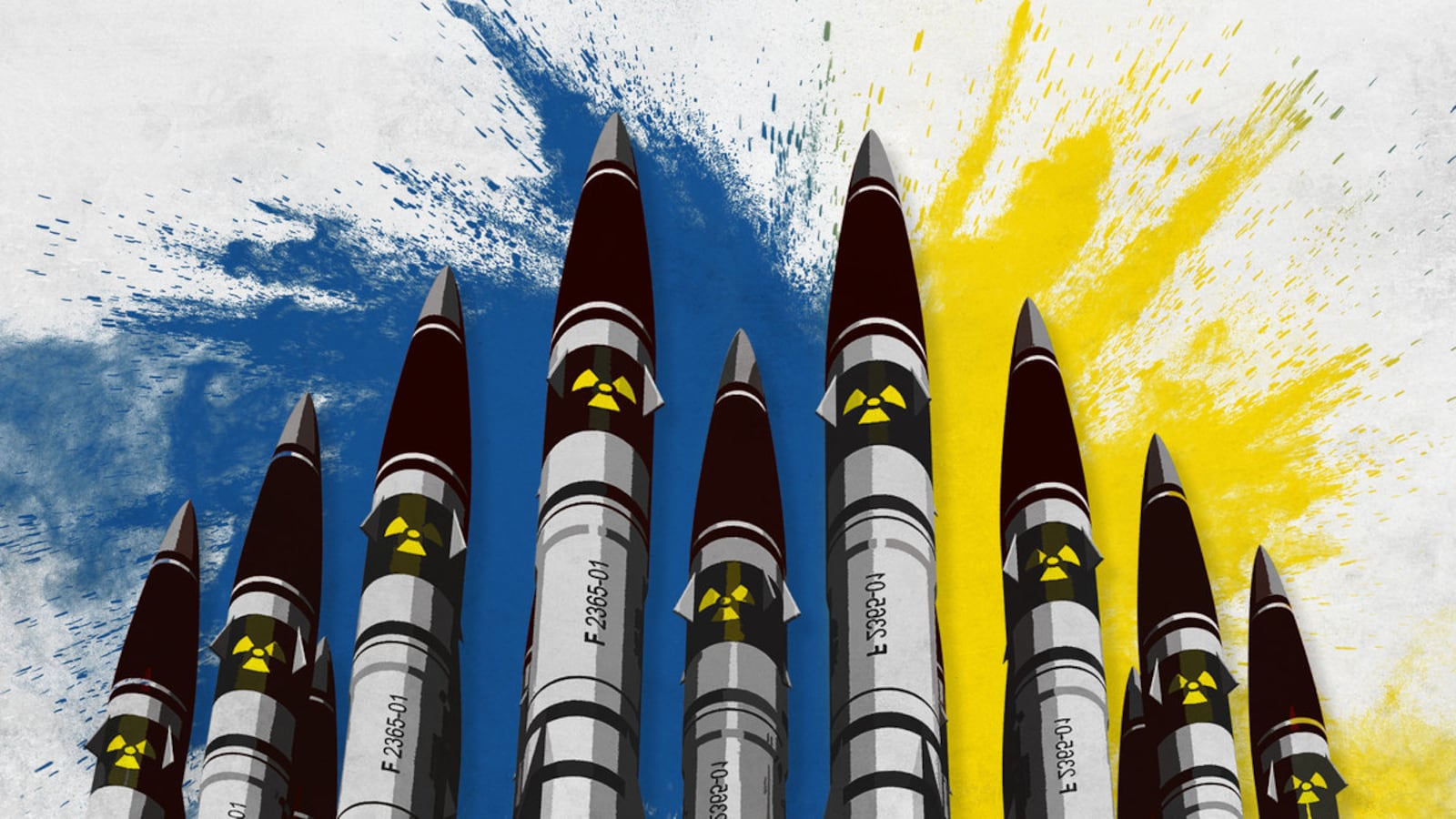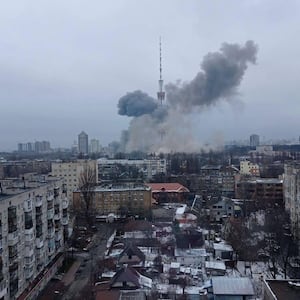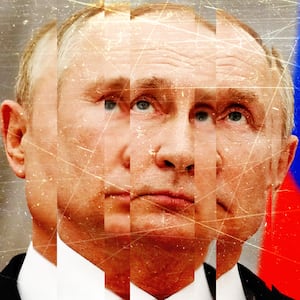The Ukraine crisis has led many nuclear weapons enthusiasts to say “We told you so.”
They claim that when Ukraine agreed to give up its Soviet-era nukes (to Russia, of all countries) the newly independent country foolishly deprived itself of a valuable deterrent. Had the leadership in Kyiv been more hard-headed and far-sighted, the argument goes, Ukraine would now be much safer.
They’re wrong.
Nuclear deterrence is legitimized in the public mind and in official strategic discourse as a way of generating safety in the nuclear age. The reality, however, is quite different: It endangers far more than it protects. Ukrainians should be thankful, not rueful, that in addition to their current tribulations, they aren’t nuclear-armed.
The most frightening thing about nuclear deterrence is its many paths to failure. Here’s a thought experiment: Imagine that Ukraine has nuclear weapons. It’s at least possible that Vladimir Putin wouldn’t have invaded that country. But it’s also possible that he’d be more agitated (hence, dangerous) than he is presently. After all, Ukraine is adjacent to Russia, so its missiles, if launched, would take only minutes to arrive. When the Soviets installed nuclear missiles near the U.S., in Cuba, President John F. Kennedy found it intolerable and was willing to risk nuclear war to get them removed. Instead of today’s “conventional” crisis, would we now be facing a Ukrainian Missile Crisis?
Alternatively, let’s imagine that Putin refuses to be cowed by Ukraine’s hypothetical nukes and continues his invasion.
What would a nuclear-armed, but conventionally out-gunned Ukraine do? Increase the alert status of its nuclear weapons? Pre-load warheads on its missiles? Maybe that would deter Russia, but it is equally likely that it could induce a quick, disarming counterforce strike, attempting to remove the “deterrent.” The Ukrainians, in turn, might well anticipate this possibility and seek to preempt Russian preemption, whereupon Russian military strategists could be seriously tempted to preempt Ukraine’s preemption, leading directly toward a destabilizing spiral.
Consider, as well, the size of Ukraine’s imaginary arsenal. If small, the possibility of disarming it could tempt a preemptive counterforce attack during a crisis such as the present. If large, there’s a significant chance that the mere build-up to a large force had already precipitated a preemptive attack long ago.
In his speech to the Russian people on Feb. 21, just before he ordered the invasion of Ukraine, Putin devoted fully one-third of his time to a conspiracy theory, as part of his effort to justify his actions.
“If Ukraine acquires weapons of mass destruction,” the Russian president announced, “the situation in the world and in Europe will drastically change, especially for us, for Russia. We cannot but react to this real danger, all the more so since, let me repeat, Ukraine’s Western patrons may help it acquire these weapons to create yet another threat to our country.”
So, Putin added to his list of grievances a false claim that Ukraine might, in the future, acquire nuclear weapons, a phony justification that quickly morphed into what he described as a real threat (“We cannot but react to this real danger”) even though it doesn’t even exist.
He went on: “We clearly understand that given this scenario, the level of military threats to Russia will increase dramatically, several times over, and I would like to emphasize at this point that the risk of a sudden strike at our country will multiply.”
So, even though Ukraine isn't nuclear-armed, just the misrepresentation that they might be serves, not so much as a provocation, as an excuse. Accordingly, if Ukraine really did have nukes, there is a very good chance that it would be a genuine provocation as well.
Deterrence is supposed to provide stability. Instead, and especially in its nuclear manifestation, it threatens just the opposite.
Here’s another scenario: Escalation to nuclear war would be a disaster for everyone, including whoever initiates it.
So, if Ukraine were nuclear-armed, Putin could plausibly assume that the Ukrainian deterrent threat lacked credibility and was a bluff. Russia might go ahead and invade as it has now done, whereupon its far superior conventional military strength would almost certainly result in a rapid advance. As the invaders approach Kyiv, or even before, it would be terrifyingly likely that Ukraine, in desperation, would use its nukes, most likely tactical battlefield weapons. At that point, just as essentially all war-games predict, it would be almost inevitable that mutual escalation would result in all-out nuclear war.
For a parallel but real situation, consider Pakistan as a stand-in for Ukraine, and India as Russia’s counterpart. Islamabad and New Delhi are both nuclear-armed, and it is an open secret that Pakistan—whose conventional forces are vastly under-resourced compared to India’s—has initiated protocols whereby in the event of an Indian invasion, battlefield commanders will have authority to employ nuclear weapons.
The strategic geopolitical situation involving nuclear deterrence is a complex Rubik’s cube, with many moving parts. For example, it is entirely possible that Ukraine’s current plight will signal to Iran and South Korea (and perhaps others, such as Egypt, Saudi Arabia, and even Japan) that obtaining a nuclear arsenal would be in their interest, although many of the catastrophic scenarios outlined above would apply to them as well.
When it comes to disasters, the mere possession of nuclear weapons—allegedly for deterrence—opens up a desperately dangerous can of radioactive worms. In addition to the risks of provocation and escalation, there have been many near misses—situations in which nuclear deterrence (if it ever existed) came unacceptably close to failing. (This includes the infamous 1983 “Able Archer” incident, in which miscommunications over a U.S. nuclear wargame conducted on the edge of Europe’s Iron Curtain nearly spooked the Soviet Union into believing it was under attack.)
These involved a panoply of computer errors, radar malfunctions, or miscommunication—all attributable to the presence of nuclear weapons whose alleged role was to deter, but in which leaders’ confidence in deterrence was so low that mutual destruction was mostly avoided by luck rather than wisdom or fear of retaliation. If Ukraine had nuclear weapons, the present crisis would almost certainly produce anxious trigger-fingers on all sides, increasing the likelihood that one such error would be the last.
This seems hardly likely to make Ukraine or the world safer. The current crisis is bad. If Ukraine had nuclear weapons, it would be even worse.







